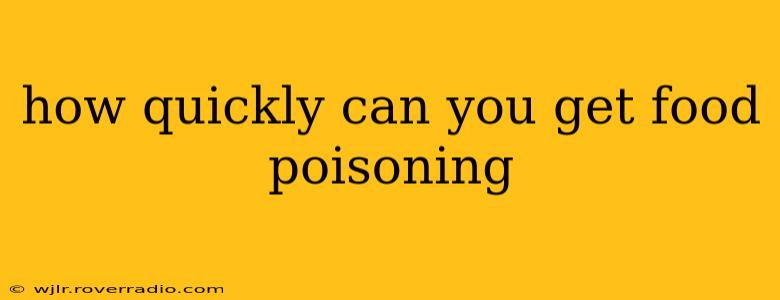How Quickly Can You Get Food Poisoning? The Speed of Sickness
Food poisoning, also known as foodborne illness, can manifest surprisingly quickly after consuming contaminated food. The incubation period – the time between eating the tainted food and experiencing symptoms – varies greatly depending on the type of bacteria, virus, or parasite involved, as well as factors like the amount of contamination and the individual's immune system. Let's delve into the specifics.
What are the common symptoms of food poisoning?
Before we explore the speed of onset, it's crucial to understand the common symptoms. These can range from mild to severe and include nausea, vomiting, diarrhea, stomach cramps, fever, and chills. Some individuals may also experience headaches, muscle aches, or weakness. The severity and duration of symptoms depend on the causative agent and the individual's health.
How soon after eating contaminated food do symptoms typically appear?
This is the question at the heart of the matter. The answer, unfortunately, isn't a single number. Symptoms can appear anywhere from a few hours to several days after eating contaminated food. Let's break it down by common culprits:
-
Staphylococcus aureus (Staph): This bacterium produces a toxin that causes rapid onset symptoms, typically within 30 minutes to 6 hours after consuming contaminated food. Think creamy foods left at room temperature.
-
Salmonella: This is a very common bacterial cause of food poisoning. Symptoms usually begin 6 to 72 hours after consuming contaminated food. Poultry and eggs are frequent sources.
-
Campylobacter: Another bacterial culprit, Campylobacter causes symptoms 2 to 5 days after exposure. Undercooked poultry is a common source.
-
Norovirus: This highly contagious virus is notorious for causing outbreaks in restaurants and cruise ships. Symptoms often appear within 12 to 48 hours of infection, sometimes even sooner.
-
Clostridium perfringens: This bacterium produces a toxin in the gut, resulting in symptoms appearing between 8 and 16 hours after ingestion. Meat and poultry are common sources if not cooked thoroughly.
-
E. coli: E. coli infections can vary significantly. Some strains cause symptoms within 1-3 days, while others have a longer incubation period.
Can food poisoning symptoms appear immediately after eating?
While some food poisoning symptoms can appear within minutes or a few hours, this is relatively less common. Most cases see symptoms developing hours, or even days later, after the bacteria or virus has multiplied in the body. Immediate onset is more frequently associated with pre-formed toxins, like those produced by Staphylococcus aureus.
What factors influence the incubation period?
Several factors influence how quickly food poisoning symptoms appear:
- Type of pathogen: As discussed, different pathogens have different incubation periods.
- Amount of pathogen ingested: A larger dose of contaminated food generally leads to a quicker onset of symptoms.
- Individual's immune system: A compromised immune system might lead to a faster or more severe reaction.
- Food preparation and storage: Improper food handling and storage significantly impact bacterial growth.
What should I do if I suspect food poisoning?
If you suspect food poisoning, it's crucial to stay hydrated. Drink plenty of fluids like water or clear broths. Rest is also essential. Avoid solid foods until your symptoms subside. If symptoms are severe (high fever, bloody diarrhea, dehydration), seek medical attention immediately.
This information is for educational purposes only and does not constitute medical advice. Always consult a healthcare professional if you have concerns about your health. Remember, practicing safe food handling techniques is the best way to prevent food poisoning.
